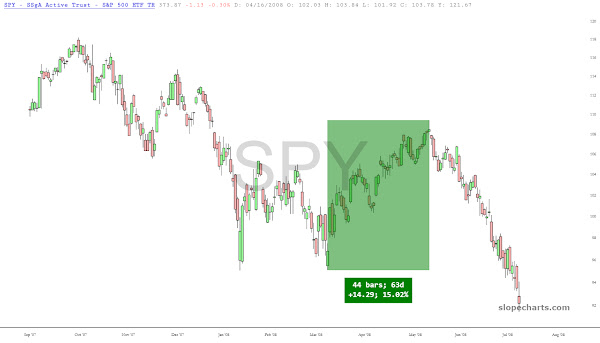European Central Bank policymakers called an emergency meeting on Wednesday, as more indebted eurozone states have come under pressure from rising borrowing costs. A week after a regular gathering, the governing council will hold an "ad-hoc meeting"...My guess: Powell told the ECB a 75 basis point hike is coming. Spreads have been widening in Europe and the market action makes an emergency meeting warranted, but why not Monday or this Friday? The day of the FOMC announcement makes me think they want to project stability ahead of a surprise. Even if I am wrong, I view the emergency meeting as a sign a culmination move is underway or possibly even over....The switch in the central bank's policy has raised the spectre of "fragmentation" in the eurozone, where the borrowing costs for some, more indebted members rise faster than for others.
There hasn't been a highlight-reel blow-up like Bear Stearns yet, but the market fell about 20 percent into January 2008 and then retested that level in March 2008. It then rallied on the Bear Stearns bailout.
My view of the current situation: the economy is in worse shape than in 2000 and 2008. The Fed really screwed up leading into 2000 and set the course for everything that followed. The 2008 crisis was one where everything happened very rapidly. There was a slow buildup with housing topping around 2006-2006, the Bear Stearns hedge funds failing in August 2007 and an emergency rate cut by the Fed, auction securities failed in February 2008, Bear Stearns in March...and then everything collapsed at once.I will kick myself if this crisis kicks off now because I closed out my JPY shorts, but I do not think this is coming right now. Like the housing crisis though, a JGB-yen crisis can be seen from miles away, in fact it was seen at least a decade away. This phase from John Mauldin was seared into my mind 12 years ago: Japan Is a Bug Searching for a Windshield
Maybe we'll do it like Japan? Japan is a disease. They're like a bug searching for a windshield. It's a dying country. Nominal GDP is where it was 17 years ago. Plus, the population is very old. When they stop funding their own debt [as a result of retirees ceasing to save], it's going to get ugly. You're going to see the yen valued against the dollar go to 100, and then 120, and then 250, 300. They won't care how low it goes. They can sell more Hondas and Toyotas to us. They're just going to print money. 40% of their budget right now is borrowed. Think about that. They're in deep dire trouble with a government that has no clue. I think Japan will implode within the next two to three years. It will not be good for the world.This event didn't happen in two or three years, but most people thought QE1, QE2 and QE3 would lead to the inflation seen now, in 2022. It took catastrophically bad policy in response to a novel respiratory virus, along with years of stupid energy policy, to get us to this point. Long Nikkei/short yen will be one of the trades of the decade if events continue playing out on the current trajectory.






No comments:
Post a Comment